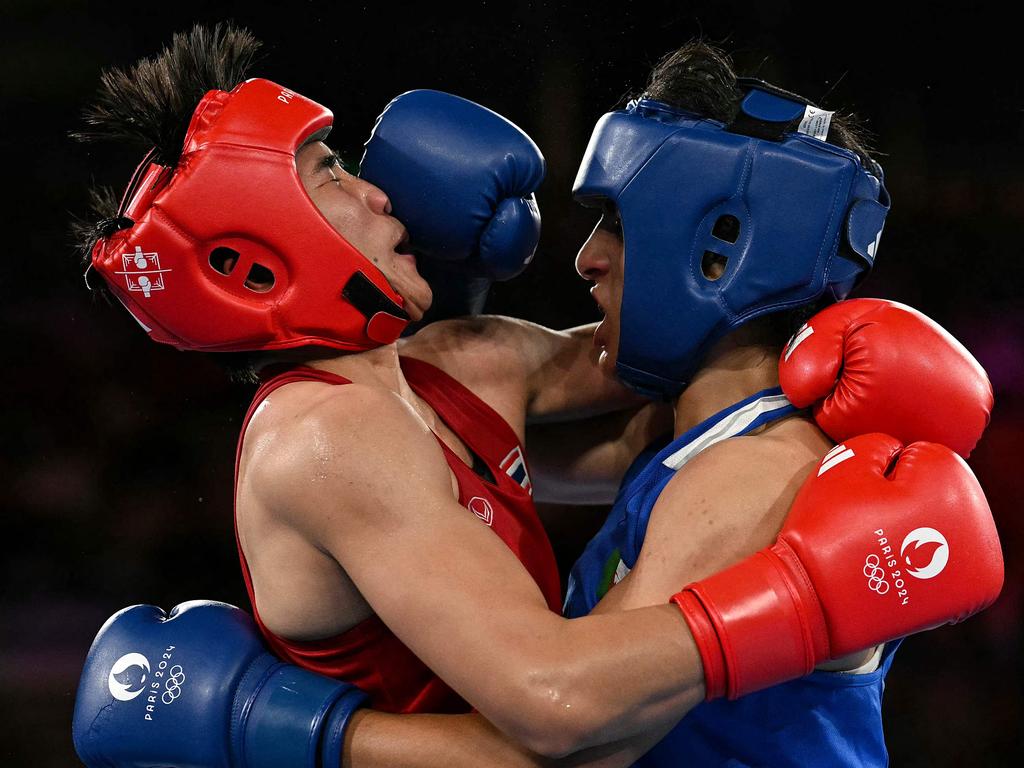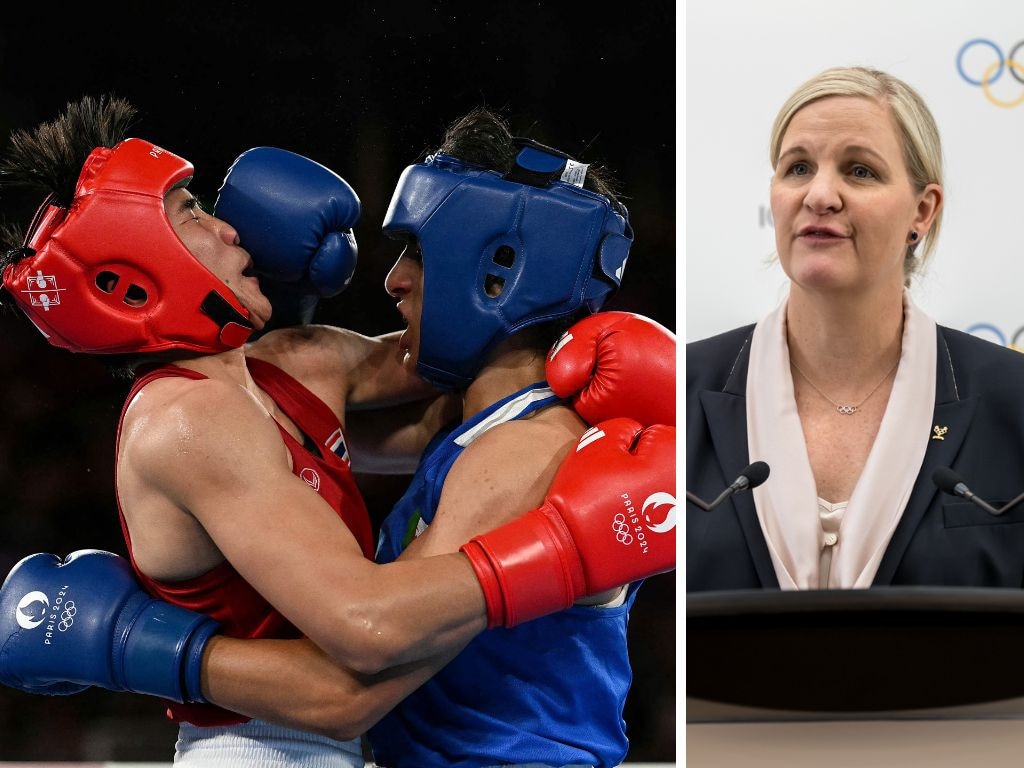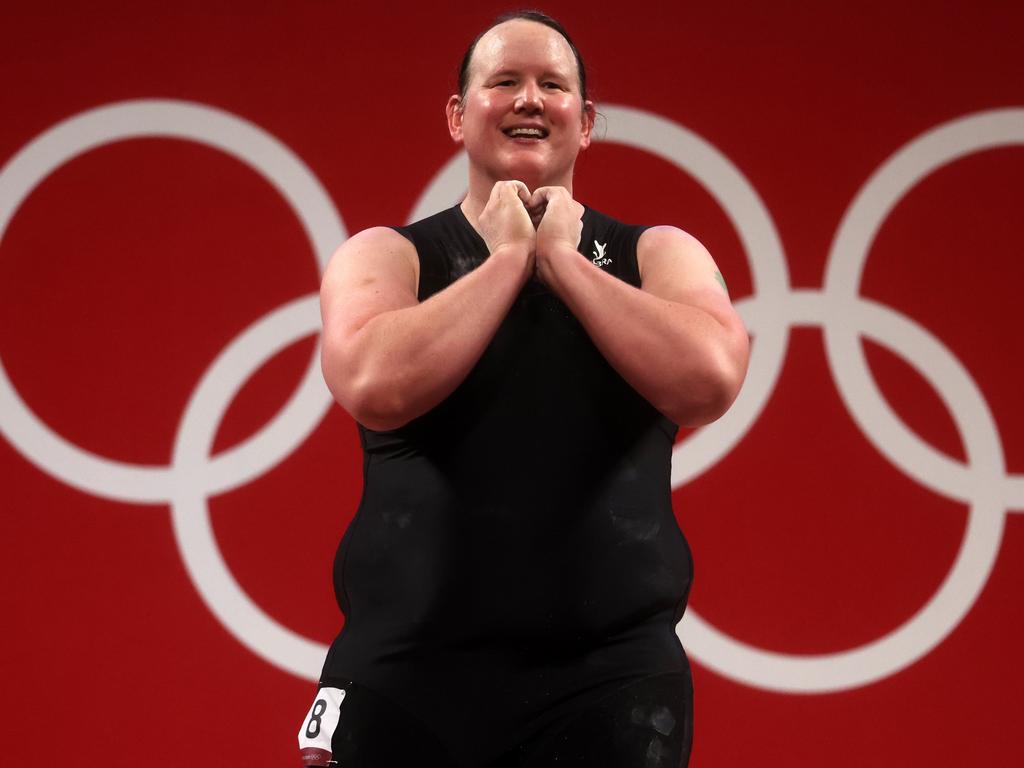Your work-life juggle is nothing on this woman’s
Kirsty Coventry is a lesson in how to have it all — and strive for more. Decades younger than her rivals, she’s now in the running for one the toughest jobs on the world stage. Having a baby, she says, proves she’s up to it.

When Kirsty Coventry decided last year to stand as a presidential candidate for the International Olympic Committee she and her husband Tyrone Seward nutted out how it could work.
Seward, a sports agent, is already working from home and looking after five year old daughter Ella while Coventry heads Zimbabwe’s Youth, Sport, Arts and Recreation portfolio under President Emmerson Mnangagwa as well as undertaking various Olympic jobs, such as heading the co-ordination commission chair for the Brisbane 2032 Olympics, the 2026 Dakar Youth Olympic Games, positions on world swimming, WADA, world surfing and her own non-profit swimming academy.
Coventry, the multi Olympic gold medallist backstroke swimmer for Zimbabwe, who has been the master of team building throughout her career, thought nothing of putting up her hand after encouragement from a coterie of senior Olympic officials, including the current president Thomas Bach.
To be a well-credentialed female Olympic gold medallist striving for such a prominent role is one thing. To be decades younger than many of the IOC membership is another. To come from Africa and lead a Swiss headquartered organisation is eyebrow raising. And so to really get the 101 members talking, Coventry was also pregnant with her second child.
That baby, called Lily, is now five months old and has been on the Olympic campaign trail almost since birth.

Working mothers can well imagine the juggling of sleep, let alone managing breastfeeding times, outfit changes and sorting airline schedules.
But Coventry says having a baby in tow shows she is well placed, and well trained, to handle the high pressure demands of being president of the world’s biggest sporting extravaganza.
She is also a little perplexed as to why some people may question her capabilities, having successfully managed her first baby when she was Zimbabwe sports minister; and she pointedly notes it is never mentioned how two of the male presidential candidates also have young families.
From Africa to Switzerland
If on March 20 she is elected president, Coventry will resign her current roles — she already has a replacement in mind to take up the Brisbane 2032 job — and the entire family will relocate to IOC headquarters in Lausanne, Switzerland.
“I was very lucky to have strong women around me that showed me that it’s possible to have a career, and be a mother and be a wife and it is about balance,’’ she says, referencing her inspirational mother Lyn who got her into swimming at 18 months of age to keep her safe around water; her beloved grandmother Shirley who raised two children single-handedly and her long-time coach Kim Brackin, whose husband was deployed to Afghanistan while she was guiding a squad of Olympic swimmers. Adds Coventry, who swam for Zimbabwe at five Olympic Games: “In this role there are always going to be times where it’s not balanced during the Olympic Games during a crisis. We all know that, but my family knows that. It’s about making that time up and when you are with them, you’re with them, you’re not on your phone. My coach Kim said it’s not always about quantity but about quality and I’ve taken that in my private life, my working life, my sporting life.”
We speak on Monday after Coventry has just landed home from the European Olympic Committee’s General Assembly, a must-attend final opportunity to speak to the scores of IOC members in Frankfurt.
She’s had less than three hours sleep on the flight but looks refreshed and sounds energised.
Coventry’s rival six Olympic candidates were also in Germany including the two considered her main opponents, both men a generation older: World Athletics chairman and former world record holder Seb Coe and Juan Antonio Samaranch Jr, a banker and son of the former IOC supremo who headed the Olympic movement for 21 years until 2001.
Olympic pedigree
Coventry is more than capable of holding her own in such rarefied company. She has been on the Olympic finance commission for the past three years and can smoothly discuss one of the members’ biggest concerns, finding new ways to satisfy the Olympic TOP sponsors, and keep the money flowing amid rising inflation and to capitalise on restructured Olympic qualifying events. The Olympic budget is more than $US7.6bn ($12bn) and each day the IOC distributes $US4.2m to sports and athletes around the globe.

The other prominent issue constantly being raised by members is having more of a say in electing Olympic host cities, and Coventry proposes not returning to the days of open bidding, but a transparent way for members to ask questions and be involved at the earliest stages of a city or region expressing interest in hosting a Games.
Members have been impressed with her ideas and depending on how the voting is split through the rounds at the election in Greece on March 20, she is favoured to be in the final two.
Assessing presidential chances when talking to the IOC members is fraught with danger for nearly everyone tells candidates they have their support: it’s just never revealed in which round of voting they may have calculated that support may be given. That’s if they are not being two-faced in the first place.
Notwithstanding the caveats, around a quarter of the membership are believed to be backing the 41 year old. It just depends on where the votes from the other candidates may land in the voting rounds. If Coventry gets the top job: one well-received plan is to have a commission specifically looking at global conflict areas, and policies will be established about the rights of athletes to compete in the Olympics despite being from a country at war.
She believes athletes should be protected and supported to compete as the Olympic charter specifically behoves political neutrality.
Athlete safety
Coventry experienced what she describes as “internal difficulties” when the Zimbabwe government under Robert Mugabe was being held accountable by the international community. The various sanctions on Zimbabwe and imposed by the US and the European Union citing human rights abuses and political corruption, have continued in various forms decades on.
“It could have easily impacted my journey at the Olympics and yet I didn’t agree with what was going on,’’ Coventry says.

“I had no say, so I was so grateful that that never happened (at the Olympics). It happened on the Commonwealth Games side of things, but on the world championships and on the Olympic Games, Zimbabwe was always able to compete, and I’m so grateful for that.
“I want to ensure that we do that for other athletes. During the Olympic Games we need to keep everybody safe and if we look at a situation like we had with Paris and we had to put in very specific rules and regulations for (Russian and Belarusian) athletes.”
She is a proud African woman who always wants to give back to the breathtaking support she has received from Zimbabwe communities and says “you can’t really create change if you don’t have a seat at the table”.
On transgender athletes
With Saturday being International Women’s Day it is important to ask the one burning question female athletes want to know. “Can you tell me what is a woman?”.
Coventry has hardened her public views on this in the past few months and she replies without any hesitation: “it’s when you’re born a woman”. She said the whole conversation around gender and sport is very simple.
While every single human being should have access to sport, when it comes to competing at the Olympic Games and in international competitions she says “there are two categories, (biological) male and (biological) female”.
And if she is in the top job in the coming weeks, the IOC will take a clear position on the issue, rather than have each of the sports grapple with rules and regulations.
Coventry says she is loving the campaign and the chance to canvas the thoughts of members, not about day-to-day challenges, but about the broad visions for the Olympic movement.
She reminds me there are more than a billion young children who are relying on the Olympic movement for inspiration and that as a mother of two young girls she feels heavily that weight of expectation.
“It gives me a lot of faith that doing it (running to be Olympic president) and how we’re doing it, is positive for our two young girls,’’ she says. “I want them to also grow up knowing that they can do anything and they can accomplish anything.”






To join the conversation, please log in. Don't have an account? Register
Join the conversation, you are commenting as Logout